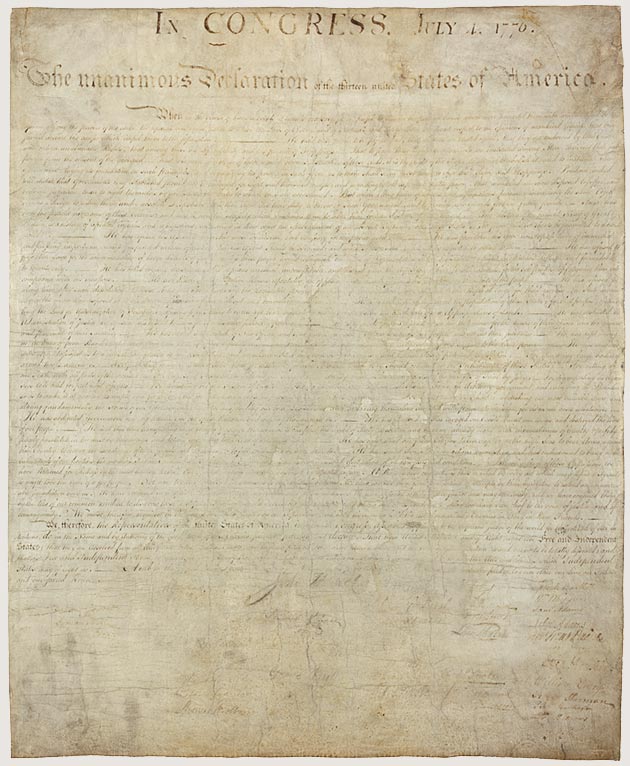NEBRASKA LEGISLATURE
The official site of the Nebraska Unicameral Legislature

Sen. Steve Erdman
District 47
The content of these pages is developed and maintained by, and is the sole responsibility of, the individual senator's office and may not reflect the views of the Nebraska Legislature. Questions and comments about the content should be directed to the senator's office at serdman@leg.ne.gov
June 28th, 2019
This week we celebrate our nation’s independence from Great Britain. As Americans we love liberty and despise tyranny. Liberty is so foundational to our American form of government that Thomas Jefferson included it as one of our unalienable rights in the Declaration of Independence. But, what led Jefferson to declare liberty as a God-given right? With some help from my staff, this is what I discovered.
The Founding Fathers were greatly influenced by the political philosophy of John Locke. In 1689 Locke published his Second Treatise on Government, which outlined his ideas for a more civilized form of government. Human rights and religious liberty were especially important to Locke because he had to escape England due to his own religious beliefs. Locke believed the primary purpose of government was to secure liberty. But, Locke also understood that liberty could not be devoid of morality, so, he wrote about civil government that, “…though this be a state of liberty, yet it is not a state of license.” Little did Locke know that his ideas would inspire an American Revolution in less than 100 years.
Revolution had been stirring in the American colonies at least since the days of the Boston Massacre in 1770. In 1773 Samuel Adams led a band of men to raid a British merchant ship, dumping its cargo of tea into the harbor. This led the British to impose the Intolerable Acts on the Colonies and to put a naval blockade on Boston Harbor. By the summer of 1774 most of the colonists had finally had enough of British tyranny. So, in September 1774 delegates from 12 of the 13 colonies met in Carpenters’ Hall in Philadelphia to conduct the First Continental Congress.
The next year tensions began escalating towards war as Great Britain began amassing military forces in Virginia. So, on March 23, 1775 120 delegates convened in St. John’s Church in Richmond to conduct the Second Virginia Convention. Among the delegates in attendance were George Washington, Thomas Jefferson and five other men who would later sign the Declaration of Independence. With “an unearthly fire burning in his eye,” according to one Baptist minister, Patrick Henry took to the podium and began to speak without using notes. Near the end of his speech Henry declared, “The war is actually begun.” And after a few more words Henry ended his speech with the words that would later make him famous, “I know not what course others may take; but as for me, give me liberty or give me death!”
On June 11, 1776 the Continental Congress appointed a Committee of Five to draft the Declaration of Independence. Those on the committee were: Thomas Jefferson, John Adams, Benjamin Franklin, Robert Livingston, and Roger Sherman. Adams and Sherman had earlier declared that the rights of conscience were sacred. But, during the days of the writing of the Declaration of Independence the subject of liberty took center stage again. The debate was whether or not a secular state could uphold liberty apart from God and morality. So, on June 21, 1776 John Adams wrote these words:
“Statesmen…may plan and speculate for liberty, but it is Religion and Morality alone, which can establish the Principles upon which Freedom can securely stand. The only foundation of a free Constitution is pure Virtue, and if this cannot be inspired into our People in a greater Measure, than they have it now, they may change their Rulers and the forms of Government, but they will not obtain a lasting liberty.”
Concluding that liberty was inseparable from God and morality, Thomas Jefferson along with the Committee of Five took the concept of liberty to the next level, carrying it out to its logical conclusion. Liberty, they decided, is a basic human right which comes from God. So, Jefferson wrote, “We hold these truths to be self-evident, that all men are created equal, that they are endowed by their Creator with certain unalienable Rights, that among these are Life, Liberty, and the pursuit of Happiness.”

Sen. Steve Erdman
P.O. Box 94604
Lincoln, NE 68509
(402) 471-2616
Email: serdman@leg.ne.gov
- Column (383)
- District Info (8)
- Events (6)
- Opinion (2)
- Press Releases (13)
- Uncategorized (4)
- Welcome (1)
-
Appropriations
Committee On Committees
Rules
Building Maintenance

Streaming video provided by Nebraska Public Media
